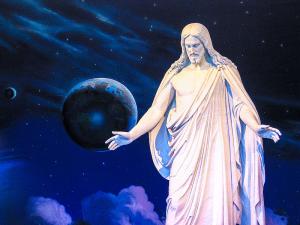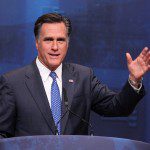
I remember the day he was elected, feeling amazed that a non-European was finally going to be in charge. I’d been LDS for a long time by then, but the prospect of some new blood…an outsider of sorts, shaking things up in my church of origin…intrigued and excited me more than might be expected of a temple recommend-carrying Mormon. The past two and a half years since his accession have been the unfolding of what I consider to be a divinely-led series of reforms and refocusings, and with Francis coming to the US next week, I’ve been thinking lately about what LDS Church leadership could learn from his style and priorities.
First of all, though, I must compliment the cardinals who elected him. It took major courage to break the mold of traditional, old world selections, and especially to choose a man not interested in continuing the mentality of his predecessors, particularly the most recent previous pope, Benedict XVI. On the LDS side, with two new Apostles to be named at General Conference in a couple weeks, it makes me wonder whether a similar eye to the future…to places outside the norm…will be shown in this case as well. Yes, I understand that both the Catholic Church and the LDS Church claim divine inspiration when choosing new general-level leaders, but you can’t tell me there isn’t some human element to it — the men through whom God works His will must feel right within themselves to suggest a given candidate to the larger group, right?
With there being more Church members outside the US than inside it, and with only one current Apostle (Uchtdorf, who is the most amazing breath of fresh air that I can’t imagine the Brethren without him) being from somewhere else, there is a considerable need for at least one of the newly-called to be from outside the US too. You cannot call yourself an international church if your highest level of leadership is overwhelmingly white and American. We are 185 years into this and it is time to start giving mature, successful ‘mission fields’ (Brazil, Mexico, and Ghana come to mind) the credit they deserve by calling one of their own to the Apostleship. Think of the wider perspective such new eyes could provide! The international Church needs and deserves representatives in high authority to speak for them and to translate between Salt Lake and Lagos or Londrina because those places are their home and not just somewhere they’ve visited or served temporarily.
Now…back to Francis. As archbishop of Buenos Aires, he drew heavily on his support of the policies of the Juan Peron era of Argentine history – a preference for taking the side of the poor in matters of social and political import. Building on this philosophy, he came to Rome with concrete in his spine and a commitment to refocus the universal church on working for justice — human, environmental (see his new encyclical Laudato Si for more on that), and spiritual (the changes he has made to the marriage annulment process are groundbreaking, and, in my view, extremely positive). His thought process is simply different from that of just about any other pope in modern history. There is no maintenance of the status quo with him. There is a desire to bring the faith down to earth and to make it easier, not harder, to stay true to that faith in the face of the myriad reasons one could encounter to leave it behind. That, to me, is a cue LDS Church leaders could take from him with much positive effect.
With warnings in General Conference, articles in Church magazines, and a website loaded with content on the topic, religious freedom is the issue of the hour (and probably more) for Mormons. With the coming General Conference being the first since the Supreme Court legalized same-sex marriage nationwide, I’m sure we haven’t heard the last of the sometimes-rather-alarmist rhetoric leaders have thrown in that direction. Forgive me for not buying the idea the sky is falling. Christianity in general has a lot bigger issues to focus on than this, and I believe Francis is an example of 21st century discipleship of Christ in this regard in particular. Our care for each other should be the heart of the matter. Civil government is going to do what it is going to do. We need to focus on what we can control, and that is our own treatment of those around us.
When Christ comes again (or when we face Him as we enter the next life), He most likely will not ask how deeply any of us believed in the traditional definition of marriage as being the end-all-and-be-all of relationships. If He cares about religious freedom, I believe it will be more in the mold of “Did you pay any attention to my oppressed and persecuted (and often murdered and massacred) followers in the Middle East, China, etc.?” than whether we sent money or prayers to those businesses in the US that refused service to same-sex couples. Remember that old line about “There are starving children in that would love to have those (brussels sprouts/mushrooms (my most hated vegetable or fungus)/whatever”? Well, there are suffering Christians in many countries worldwide who would love to ‘struggle’ with the question of which side of the same-sex marriage issue the come down on rather than the real, life-and-death religious freedom (and clean water, and sanitation, and adequate food, and…) of which they are being deprived. That, in my mind, is the Francis difference, to coin a phrase, and it begs our attention as fellow followers of Christ.
All the press being given to religious freedom, regardless of the fact that most of these messages include instruction to practice charity in following them, is often taken as license to mistreat those who see the issue differently. It has, in cases, come down to “are you on the Lord’s side or not?”. It is that black-and-white to some people. So, what if instead of more talk to add fuel to the fire, we got more counsel on acts and behaviors that can serve to unite us rather than divide — on concrete ways to show ourselves our differences in politics or social matters is irrelevant in the grand scheme? How can we be more just people and less condemning and judgey? How can we make it easier on each other to follow Christ according to the dictates of our individual consciences? That’s a Conference talk (or several)…an Ensign article series…a focus I’d love to see the Church move toward instead of the current fearmongering that we won’t be able to practice our religion anymore one of these days because of the evil gubmint.
The LDS persecution complex is another post for another time, but I believe it has a lot to do with why Church leadership cares so much about religious freedom. It is also something I hope will lessen as more leaders with international backgrounds join the crowd. The positivity and openness of President Uchtdorf is nothing if not distinctive, and I don’t think that is an accident. Those who come from elsewhere best know what it is to be part of the minority (of any kind, but of the religious type here) — the happy ways in which we can be a light and an example to those of other faiths (or none), and additionally, those who are converts from elsewhere have the extra benefit of knowing life pre- and post-conversion. They have something to compare against, and in many instances, that simple fact helps Church ‘lifers’ lose some of the tunnel vision possible in their circumstances.
The Church needs to get rid of the persecution complex, and one of the surest ways to work toward this end, in my estimation, is to put ‘outsiders’ in general leadership positions. Thomas, meet Francis. His ideas are for all people of goodwill, and Mormons would be well-served to be seen as such more than they are these days.
PS: Be sure to pay attention to the news next week during the pope’s visit — he will be in the country Tuesday through Sunday, including addressing a joint session of Congress Thursday morning, the UN General Assembly Friday morning, motorcade through Central Park that afternoon and Mass that evening at Madison Square Garden, a prison visit in the Philly area Sunday morning, and the big Mass in the city Sunday afternoon before heading back to Rome that night.












